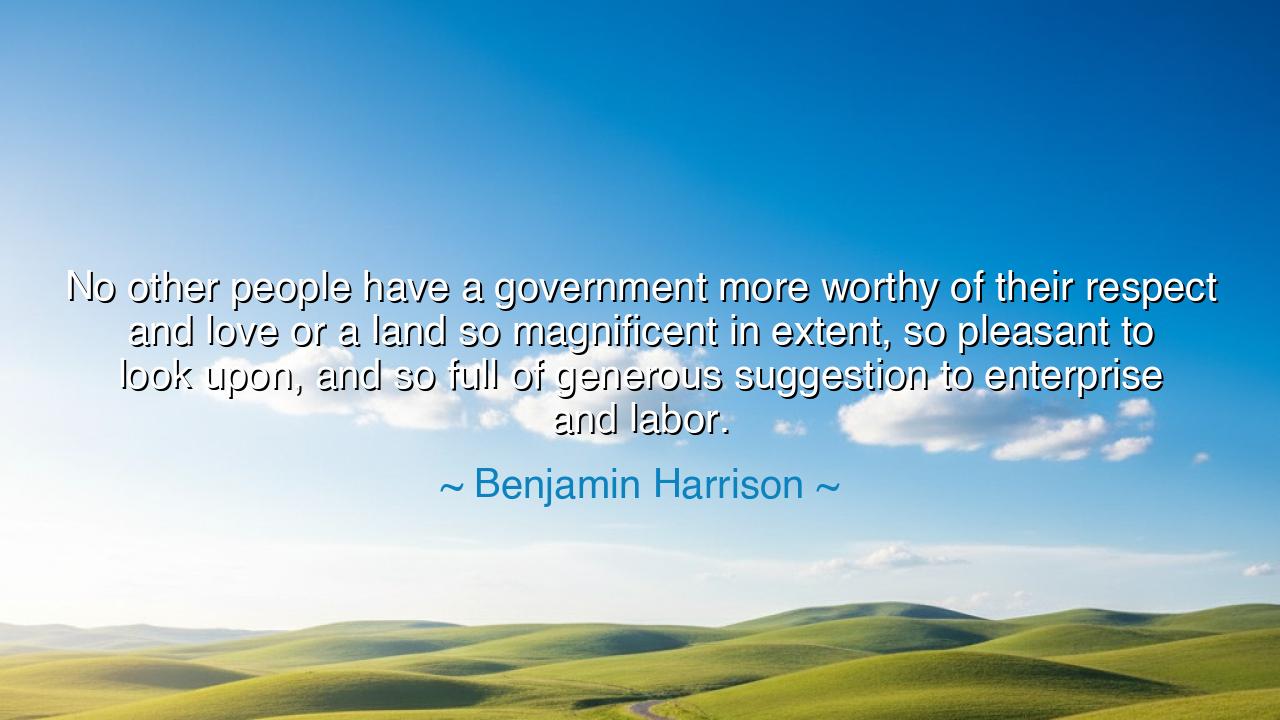
No other people have a government more worthy of their respect
No other people have a government more worthy of their respect and love or a land so magnificent in extent, so pleasant to look upon, and so full of generous suggestion to enterprise and labor.






"No other people have a government more worthy of their respect and love or a land so magnificent in extent, so pleasant to look upon, and so full of generous suggestion to enterprise and labor." – Benjamin Harrison
In these noble and patriotic words, Benjamin Harrison, the 23rd President of the United States, expresses not mere pride in his nation, but a profound reverence for the sacred bond between people, land, and government. His declaration is not the boast of an empire, but the gratitude of a citizen. When he speaks of a government “worthy of respect and love,” he invokes the highest ideals of democracy—one that protects liberty, rewards labor, and rests upon the consent of the governed. And when he praises the land, he celebrates not only its beauty but its promise—the vast canvas upon which generations of Americans were called to paint their dreams.
The origin of this quote lies in Harrison’s speeches and writings during his presidency in the late nineteenth century, a time when America stood between the echoes of its founding and the dawn of its industrial destiny. It was a nation both scarred by civil war and strengthened by its survival. Railroads stretched from ocean to ocean; immigrants arrived by the millions, seeking freedom and opportunity. Harrison, himself a descendant of Revolutionary heroes, saw in this flourishing republic the living proof that self-government and divine providence could coexist in harmony. His words were meant to remind his fellow citizens that the blessings they enjoyed—peace, prosperity, and independence—were not gifts to be taken lightly, but trusts to be honored.
In the ancient manner, his statement may be read as both praise and admonition. To say that a government is “worthy of respect and love” implies that it must remain so—that its virtue must be guarded by the people. For governments, like men, are not noble by nature; they are ennobled by duty. Harrison’s sentiment therefore carries a quiet command: if we wish to continue deserving this blessed inheritance, we must labor with both gratitude and vigilance. Love of country, he reminds us, is not a passive feeling—it is an active responsibility, born of service, honesty, and sacrifice.
Consider the story of George Washington, who, after leading the young nation to victory, might have crowned himself king but instead chose to step away from power. His restraint established the moral foundation of American governance—that leadership is service, not dominion. In Washington’s act, we see the kind of government Harrison praises: one “worthy of respect and love,” because it is rooted not in fear or ambition, but in principle and humility. Such examples remind us that patriotism must always be tied to virtue; love of country without integrity is mere idolatry.
When Harrison speaks of the land—“so magnificent in extent, so pleasant to look upon, and so full of generous suggestion to enterprise and labor”—he touches upon the spiritual dimension of the American landscape. To him, the nation was not only a place of mountains and rivers, but of opportunity and purpose. The plains, the forests, and the cities yet unborn represented the boundless potential of human endeavor. It was the duty of every citizen, through enterprise and labor, to honor the abundance of their homeland—not to exploit it greedily, but to cultivate it with reverence. In these words, Harrison offers a vision of patriotism grounded in stewardship, not conquest.
Yet, his statement carries a quiet warning as well. A government, however noble, can fall to corruption; a land, however fertile, can be stripped of its bounty; and a people, however proud, can lose their reverence if they forget the principles that sustain them. History bears witness to nations that rose high only to collapse under the weight of their own vanity. Harrison’s praise thus doubles as a reminder that greatness endures only where virtue and gratitude dwell. The republic he cherished could not be preserved by prosperity alone—it required the daily labor of character.
The lesson of Harrison’s words is timeless: to love one’s country rightly is to serve it faithfully. Respect for government does not mean blind obedience, but recognition of its moral purpose—to safeguard liberty and justice. Love for the land does not mean mere admiration of its beauty, but a commitment to work it honestly and preserve it for those who come after. Each citizen, in every age, must see themselves as both beneficiary and guardian of this inheritance.
So let us hear his words not as relics of an older patriotism, but as a living summons: to remember that our government is but the reflection of our virtue, our land but the stage of our labor, and our future but the harvest of our gratitude. For when a people respect what is just, labor with integrity, and love their homeland with humility, they fulfill the vision that Harrison so eloquently saw—a nation magnificent in its land, noble in its governance, and everlasting in its hope.






AAdministratorAdministrator
Welcome, honored guests. Please leave a comment, we will respond soon